Finally, some peace and prosperity for Tigray!
Water to Thrive just completed their 2024 site visits with The Relief Society of Tigray (REST). We are so grateful for their hard work and diligence during our visit. With their assistance, we captured many transformative stories.
We even had the opportunity to visit a rural community located deep within the beautiful mountains of Aksum, Ethiopia!
This community was amongst the very first to be impacted by the three-year civil war that destroyed hundreds of wells within the regions of Tigray, Ethiopia. Once again returning the people here to a primitive life of fetching water by extreme measures. Such as, long dangerous walks for water, and the digging of sand ditches all day long just to collect dirty water that would eventually cause the spread of many waterborne illnesses and diseases. But the people here were desperate and had no choice. Infact, many of them were forced to leave their homes for months while troops lived here, and in some of the villages where the location was used as a strong hold, the people had to leave their homes for the entirety of the war!
It has been a year since the peace treaty was issued here and the people are clearly prospering thanks to the return of clean water from the site repairs facilitated by Water to Thrive.
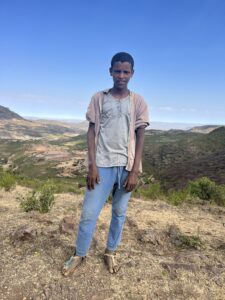
While hiking to a well site in Aksum, we crossed paths with this young boy named, Amede, who kindly gifted us some chickpeas which he picked fresh for us along the trail. He was shy at first but eventually he shared his story of transformation! Amede said the clean water has completely changed his life. He is back in school finally and there is peace amongst the people.
During our long hike to one of the communities within this region, a local twelve-year-old boy named Amede started following us. Once he gained the courage to get closer, he presented us with a gift of fresh beans he had been picking for us. We sat together for a while, enjoying a much-needed snack and break.
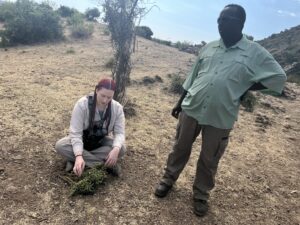
Gashaw and I are enjoying some fresh chickpeas gifted to us by Amede.
Hiking through the mountainous terrain of Tigray is beautiful but no easy feat, and when you add grazing livestock to the mix, it is even more challenging! We managed to dodge a large camel and bull while navigating the narrow cliffside path! All of this, I think, was probably quite amusing to Amede!
While snacking on our beans, the young boy became more comfortable and opened up to us about his personal story of struggle and triumph. He has not had an easy life, but his spirit is strong, and he is grateful to be attending school again now that there is peace here.
For three years, a tragic civil war plagued these lands and has, of course, had a significant impact on the civilians.
In the rural villages, many of the wells were damaged by invading troops, which left the people here struggling to survive. However, Tigrayans are extremely resilient and continue to persevere despite their many challenges.
We visited this area one year ago, just three months after the peace treaty. The people’s stories were heartbreaking, and the conditions were devastating.
Through grant funding, Water to Thrive has been working with REST to repair the wells that were destroyed by the troops during the conflict.
To our surprise, a lot has changed in just one year. Of course, a major contributor to this change is access to safe, clean water.
With the long walk for water being eliminated through our well repair work, many of the villages reported an increase in their ability to spend more time tending to their farms and grazing their animals. As a result, their crops and livestock are flourishing!
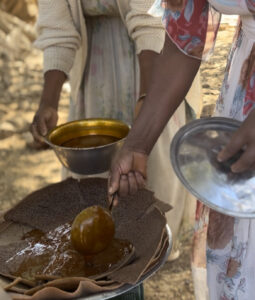
Shiro from a local village, placed on top of a large piece in injera. We did not see Shiro in these regions last year due to a high amount of food scarcity.
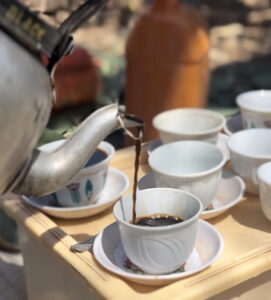
Fresh Ethiopian coffee! Bold and delicious!
This was exciting to hear, considering this region was on the brink of famine not long ago and had very little media coverage or support.
The community manages the well’s maintenance through the establishment of a water committee, which consists of at least 50% women. The communities all receive Sanitation and hygiene (WASH) training to ensure the well’s sustainability.
In addition to this, they establish a user fee, which is critical to economic development within these regions because this process builds a strong community cooperative and is key to lasting, progressing change.
There is still a long way to go, but positive transformation is clearly happening here, and in such a short period of time.
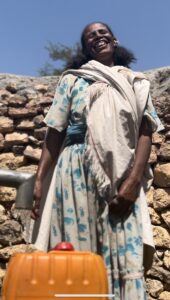
Prior to the well repair, Ametetsion explained how the people in her village would dig sand ditches in order to collect water. She is very happy that she is now able to collect safe, clean water from her newly repaired well.
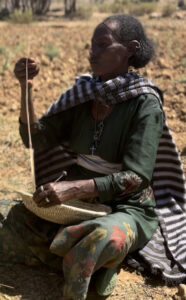
This woman is proudly weaving a basket to sell in the local market. An income-generating task that was not possible prior to the well repair.
We know that with the undying support of our partners at REST, peace and prosperity will fill these lands for many years to come!
-Jamie Morris
Marketing Director
Water To Thrive